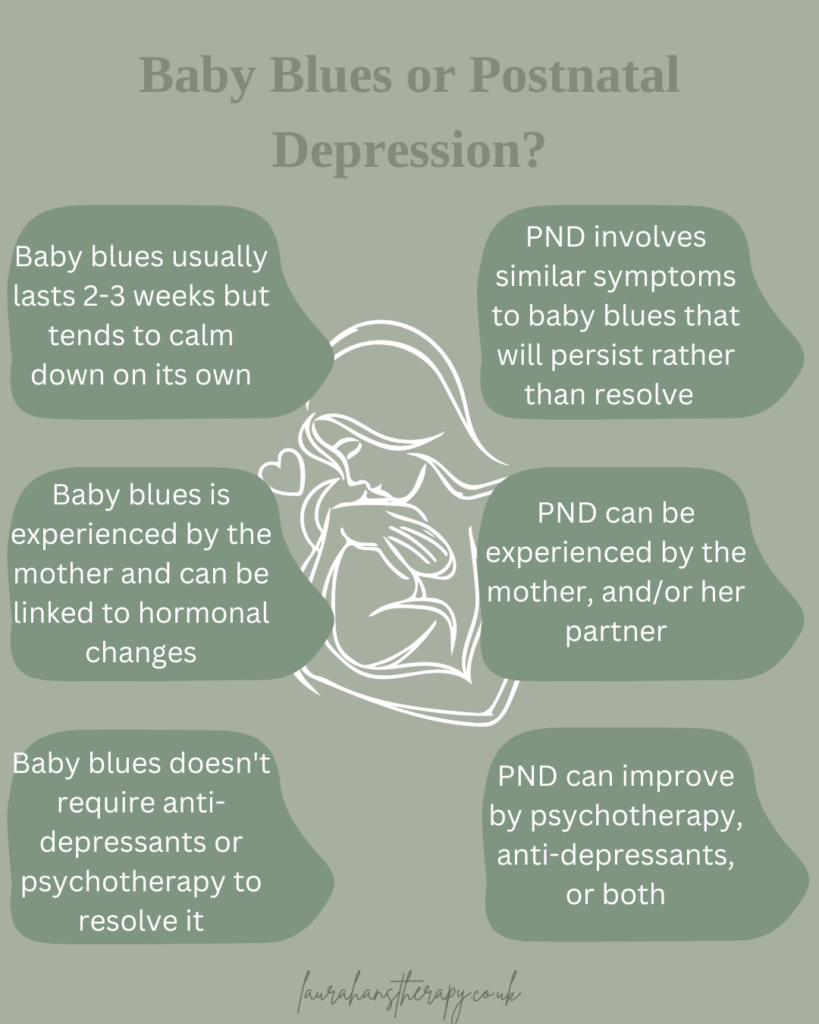You may be wondering whether the change in how you are feeling after having your baby is down to the baby blues, which can happen to up to 80% of women, or whether it is a sign of Postnatal Depression (PND).
The baby blues tends to be experienced by the mother and can include feelings of anxiety, stress, and being overwhelmed. If you are feeling emotional after having your baby, this is totally normal! It's such a big transition you have just experienced, and there is a lot to process, so please be kind to yourself. It is very common for you to be feeling emotional and tearful about things that may seem small to someone on the outside. You may not know why you are feeling the way you do - and that is ok! My advice, don't judge yourself for feeling whatever you feel, just go with the flow of each feeling, knowing that difficult feelings will soon be replaced by other feelings.
The causes of the baby blues tend to be mainly linked to hormonal changes, but lack of sleep can also be a factor, in addition to the new responsibility of having a baby.
The baby blues tend to last up to two/three weeks and typically subside on their own. However, if your symptoms persist, or start to become unmanageable, it may be a sign of Postnatal Depression, which can affect up to 1 in 10 women. Postnatal Depression is also thought to affect 1 in 10 dads/partners (although I discussed recently how this figure is probably higher but is largely under-reported). If you wanted to find out more about PND in fathers/partners, my blog Post-natal Depression in men/partners | Laura Hans Therapy might be of interest to you.
The typical symptoms of Postnatal Depression are:
- losing interest or pleasure in things you used to enjoy (this can include lack of interest in baby)
- appetite changes
- problems with sleeping
- trouble concentrating
- feeling down/depressed or hopeless
- lack of motivation and energy
- thoughts of suicide and/or self-harm
- excessive anxiety and worry
- intrusive thoughts
Mild PND can often respond well to small changes in day-to-day activity, such as increasing daily exercise. I have developed a free guide on managing mood which is available to subscribe to via my website. This guide provides step-by-step tips on how to increase activities that you enjoy and decrease activities that keep you stuck feeling low. It is emailed to you straight away and available for you to start working through independently. Please feel free to access this straight away and let me know how you found it.
If the symptoms of PND are more moderate/severe, or if the PND is rooted in pre-existing mental health difficulties, it may warrant medication from your GP and psychological support to guide you through and out the other side.
Postnatal Depression, no matter how severe it is, can and is overcome by many with the right approach, which is dependent on the individual. If you think psychological therapy may help or are unsure and would like to discuss this further, you can book in a free consultation with me here and I would be more than happy to explore this with you.
Useful Links:
Subscribe To Your Free Managing Mood Guide
Hold The Mother Podcast Episode 6: What Is Matrescence?
Hold The Mother Podcast Episode 9: Intrusive Thoughts In Parenthood



